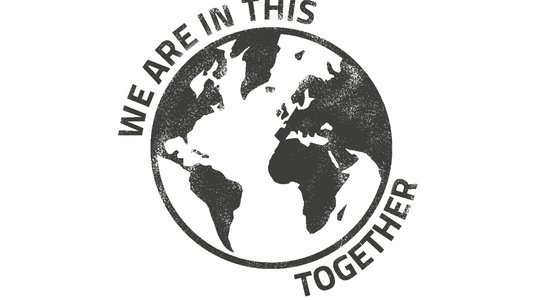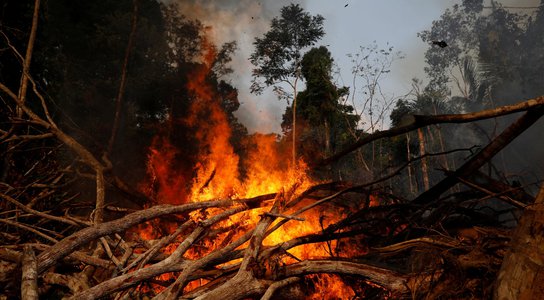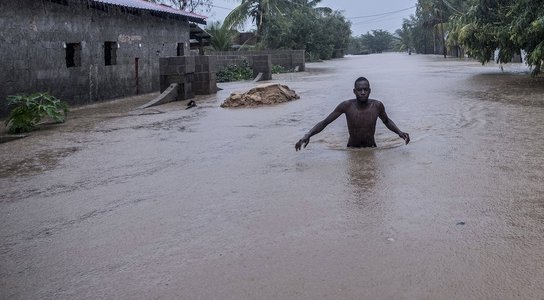As a deadly orange mist surrounds California, French farmers in the Loire Valley are looking on aghast at land desiccated by the worst droughts on record and a month after a third of Bangladesh was underwater. The devastating impacts of the climate crisis are becoming ever more stark and difficult to ignore. Faced with the undeniable reality of this threat, and supported by years of work from scientists, NGOs and concerned citizens, this is an issue that is front-and-centre of public consciousness like never before.
Yet still too many of the wealthiest and most powerful voices are invested in propping up the very systems that are driving the climate crisis. Nowhere is this more apparent than amongst the fossil fuel industry, who are investing millions of dollars into convincing the public and politicians to make the same catastrophic mistakes we have been making for decades. Rather than using the overwhelming changes to the global economy and consumer patterns brought about by the COVID-19 pandemic to seek to ‘build back better’, they want more public money to do exactly what they have done before; and continue to wreck the climate along with it.
At Global Witness we recognise just how crucial this moment is. We all need to step up and play our part in supporting the success of the climate movement - and that’s exactly what we are trying to do.
Since our inception 25 years ago we have stood up to some of the world’s biggest polluters, fought in the corner of those defending their land and partnered with the many organisations who have worked tirelessly to wake the world up to the reality of climate change. We’re proud that top executives at Shell are currently on trial on corruption charges in Italy, following years of dogged campaigning by our team. We’re pleased our work contributed to companies working across Papua New Guinea and the Amazon Basin being held responsible for driving illegal deforestation.
But the urgency of the climate crisis shows us it’s not enough to simply demand accountability and transparency. We need to join with others to call for much more systemic change. It’s not enough for fossil fuel companies not to be corrupt, we must now demand fossil fuels are kept in the ground. It’s not enough for the timber trade to operate legally, we must now demand that the forests critical to protecting the climate are kept standing.
This is one reason why our recent strategic review hasn’t just focused on how we can do the same better, but instead what we must do differently. Our strapline says we work to ‘Expose the Facts. Change The System’, but, I wonder if, at times, we’ve been more focused on improving existing systems than championing more fundamental change. So we have shifted our approach to more directly address the crisis at hand. We’re joining calls for a revolution, a new global system in which the protection of the planet is put ahead of profit-making and governments legislate to ensure we can prevent the catastrophic impacts of the climate crisis.
We want to turbo-charge this shift by bringing our investigative, campaigning and communications skills to uncover the role corporations and financial institutions are playing in undermining efforts to stop climate change and their attempts to muddy the waters on what will actually make a difference in the protection of our planet.
On fossil fuels, therefore, our focus will be on ending the myth that fossil gas is the answer to the climate crisis. It brings us up against foes we have confronted previously, as we sought to expose the corruption in the oil sector. The big companies who previously got the world hooked on oil are now championing fossil gas as a green, environmentally-friendly energy alternative. This is simply not true. If we are to meet the goal set out in the Paris Agreement of limiting global warming to under 1.5C, gas production and consumption needs to drop by 40% worldwide over the next decade. Instead, the largest fossil fuel companies are campaigning not just to be allowed to go ahead with new gas projects but also, to be subsidised by taxpayer money to do it. We will do whatever we can to stop this.
We know tropical forests act as a vital carbon sink and play a key role in regulating the global climate, but each year millions of hectares of this vital biosphere are being torn up as companies look to make a profit from the land. Our focus will be on closing their access to the global finance and investment that allows them to function and grow. Our recent report Money to Burn showed how over 300 financial bodies in all parts of the globe contributed $44 billion to companies - largely multinational agricultural businesses producing beef, soy and palm oil - who are responsible for deforestation, especially in the Amazon, Congo Basin, and Papua New Guinea (PNG). Our work is aimed at regulatory change to ensure that banks and investors cannot continue to fund the destruction of the forests. In doing so we aim to end the ongoing decimation of climate-critical tropical forests completely.
In this endeavour, we continue to be awed by brave individuals and communities living in areas being developed against their will and who are going up against some of the biggest and most powerful companies in the world to stop it, despite the huge risks. We continue to campaign to protect those defending their land, who routinely face, harassment, threats, violence, arbitrary arrest, imprisonment, and murder. They are on the frontline of the fight to protect the planet and their vital work needs our support. We expose the links between local incidents of intimidation or violence and the global agribusiness industry, which is complicit – and sometimes individual companies are even instigators – of such violence. Hand-in-hand with partners and community groups right across the world, we aim to end the killing of land and environmental defenders, address the underlying causes of attacks against them, and ensure those who commit or are complicit in violence against them face the full force of national or international law.
As we step up our campaigns to expose the abuses of power by big companies driving climate change and call out government inaction to prevent it, we also know we need a set of global standards that can be enforced to ensure the future of our planet is safeguarded from rapacious profit-makers and investors. We will be advocating for a new corporate accountability law with real teeth that can do just this.
In just over a year, global leaders will gather at COP26 to make the agreements that will underpin the world’s approach to the climate crisis. Like us, they can no longer be satisfied with improving systems that already exist. This will be their chance to listen to the climate movement, ignore the lobbying efforts that big corporates will spend millions of dollars on in the lead-up to the summit and play their part in sparking the revolution required to save the planet for generations to come.


